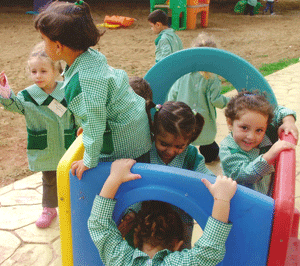DEARBORN — Hiam and Ibtisam Bazzi were seven and four years old when their mother died in 1977. Their father, unable to care for them alone in impoverished south Lebanon, placed them under the care of the Sadr Foundation, a network of orphanages, schools and clinics based in Tyre that has served tens of thousands of Lebanese over the last 45 years.

|
|
Children play on the grounds of the Sadr Foundation’s Tyre, Lebanon cultural complex, where about 1440 orphans and other children in need are enrolled in a broad set of social, educational and health programs. Photos courtesy Sadr Foundation |
“We were always encouraged to believe anything was possible,” said Hiam Bazzi about the educational and social support the foundation provided.
“After all I was taught there, I want them to know that I’m going to continue my education. I see it as a repayment to them.”
About 1,440 orphans and needy youth are currently enrolled in the organization’s programs in south Lebanon. Tens of thousands more visit Sadr Foundation health and social centers annually. And a local extension of the group, Sadr Foundation-USA, supports overseas efforts while raising funds for Detroit-area hospitals, homeless shelters and nationwide causes.

“We are a Michigan-based nonprofit… our own entity,” said Hamid ElSadr, the group’s chairman.
“We don’t just send money [to Lebanon]. We check around us and see what’s needed… We like to be part of our community here.”
Based in Dearborn, Sadr Foundation USA has in the past raised funds for Hurricane Katrina victims, Detroit Children’s Hospital, and most recently Oakwood Hospital’s Center for Exceptional Families.
The group is preparing for its annual fundraising banquet, set for March 26 at the Islamic Center of America, 19500 Ford Road in Dearborn, at 6 p.m.

Hamid ElSadr is the son of Imam Musa ElSadr, who established the foundation in the 1960s as a major political leader among Lebanese Shi’a Muslims and a world-renowned advocate for interfaith dialogue.
Musa ElSadr disappeared in August 1978, along with two companions during a trip to Libya. The three were never heard of again. Libyan leader Moammar Qadhafi has been widely accused of having ElSadr abducted or killed. Libya has consistently denied responsibility.
Chaired by Rabab ElSadr, the sister of Musa ElSadr, the foundation grew to fill voids in south Lebanon left by war, occupation, economic deterioration, brain-drain, illiteracy and widespread psychological trauma.

With a core goal of providing care to girl orphans, taking them in at the age of five and seeing them through higher education, the group’s complex has grown to include care for young boys, a special education center, vocational schools, clinics, a cancer center and mobile clinics.
Sadr Foundation-USA board member Mohamad Bandar said the mobile clinics proved especially important during 2006, when the area was bombarded in a month-long war with Israel.

|
|
A Sadr Foundation medic treats a patient inside one of the group’s six mobile clinics that travel to rural areas in south Lebanon where access to health care facilities is limited. |
He said the mobile clinics and other programs have allowed health and social workers to actively go out into rural and impoverished areas and find those in need.
Each of the foundation’s programs, Bandar said, operates hand-in-hand with different international aid groups, including USAID, the World Health Organization and UNICEF.
Hamid ElSadr said the orphans and children who enroll in the programs are taken into a system that tries to normalize their lives and ease them into a complete social atmosphere.

“We take on the parents’ role,” he said. “The orphans are taken in at the age of five and they are taken care of not just financially but spiritually… To take out the feeling of being an orphan… We do that by loving them, by feeling for them, by taking care of them… It helps their spirit.”
Board member Cheryl ElSadr said the women who come out of the care of the Sadr Foundation have a distinct “strong women” quality about them.
“Imam Musa always stressed the importance of women being involved in society,” she said, “and that was a new notion at the time.
“They strive to empower women and help them to be independent, educated and confident.”
Rabab ElSadr, who plays a major, direct role in the lives of the girls and women in the Sadr Foundation programs, is expected to attend the March 26 dinner.
“She has an aura about her that everybody knows that she’s someone special,” said Cheryl ElSadr about the chairwoman.
For more information about the Sadr Foundation-USA, or about the March 26 event, call Rached Elmasri at 313.643.2559 or Leila Fawaz at 313.584.4600.






Leave a Reply